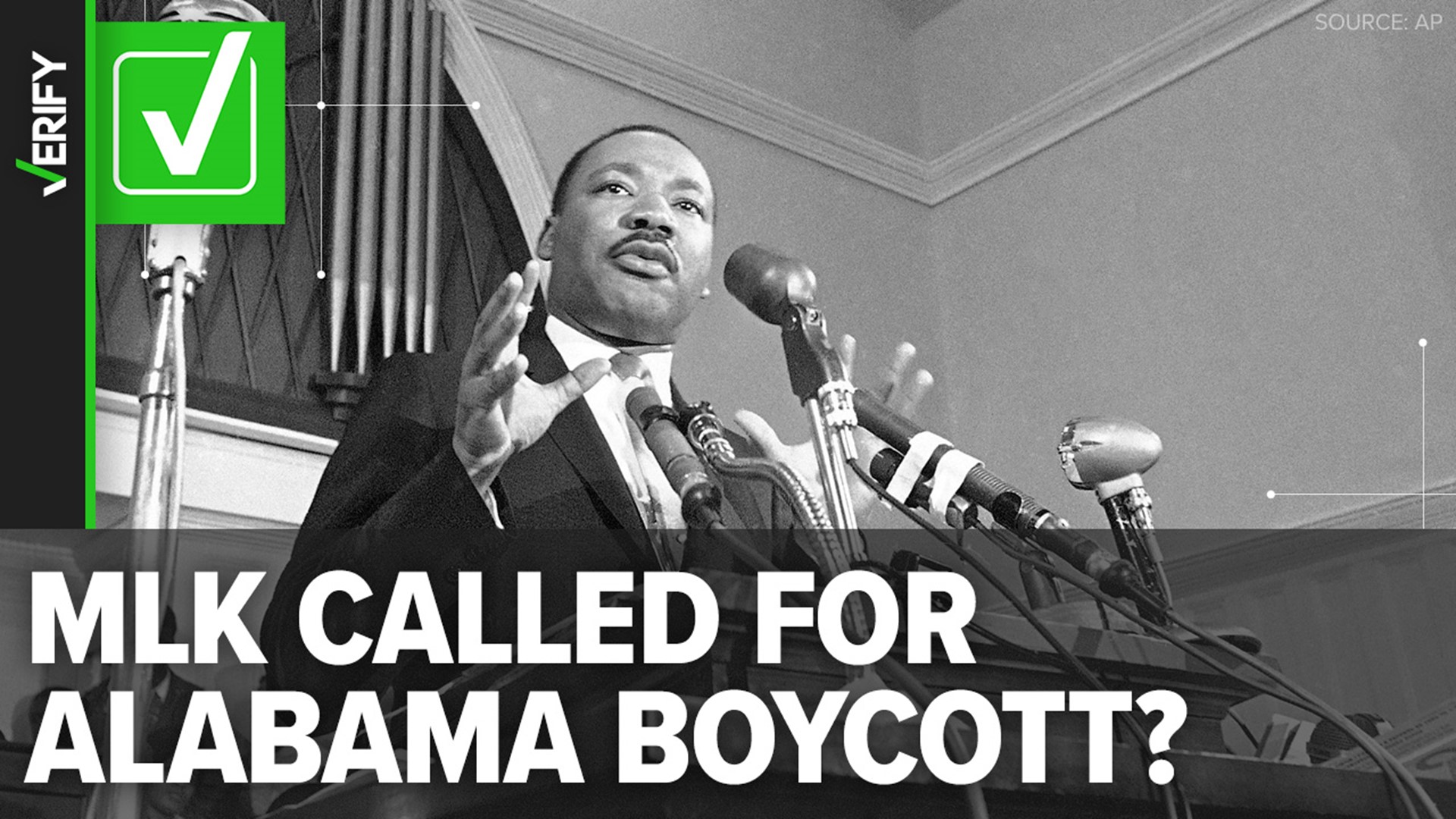On May 20, the NAACP issued a travel advisory for the state of Florida in response to Gov. Ron DeSantis’ policies. The NAACP says people should understand that “Florida devalues and marginalizes the contributions of, and the challenges faced by African Americans and other communities of color” before traveling to the state.
In response, Sen. Ted Cruz (R-TX) said the NAACP did extraordinary good in the 1950s and 60s in leading the Civil Rights Movement, but then claimed “Dr. King would be ashamed of how profoundly they’ve lost their way.”
Kevin Kruse, a Princeton University historian, responded with his own viral tweet that claimed “Dr. King called for a national boycott of the state of Alabama” in 1965 for its policies against Black Americans.
THE QUESTION
Did Martin Luther King Jr. call for a national boycott of Alabama in 1965?
THE SOURCES
- King’s March 28, 1965, interview on NBC’s Meet the Press
- Civil Rights Movement Archive
- Congressional Record
- Issues of Jet, a weekly magazine known for its coverage of the African American community and early Civil Rights Movement, from 1965
THE ANSWER
Yes, Martin Luther King Jr. did call for a national boycott of Alabama in 1965.
WHAT WE FOUND
Martin Luther King Jr. was one of several civil right leaders and organizations to call for a national economic boycott of Alabama in 1965. The boycott was designed to protest Jim Crow laws that blocked Black Americans from voting and pressure then-Gov. George Wallace into guaranteeing the right to vote in his state.
King voiced public support for such a boycott in a March 28, 1965, interview on NBC’s “Meet the Press.” The main topic of the interview was the series of historic marches King led earlier that month between Selma, Alabama, and the state’s capital, Montgomery. At about 17 minutes and 40 seconds into NBC’s archive of the interview, John Chancellor, an NBC journalist, asked King about a potential strike.
Chancellor: Dr. King, we have reports from Atlanta which indicate that you will recommend to the nation's labor unions a nationwide work stoppage to keep the plight of Alabama Negroes before the country. Now can you give us some details on this plan?
King: Yes, Mr. Chancellor. I think the conditions in Alabama have degenerated to such a low level of social disruption and such a low level of man’s inhumanity to man that the whole conscience of the nation must rise up and engage in some kind of creative firm action program that will bring the business leaders and decent people of Alabama to the point of bringing pressure to bear on Governor Wallace and other officials who are responsible for this reign of terror.
King, beginning at 19:09, then went on to say:
King: Consequently, I think that it is necessary for the nation to rise up and engage in a massive economic withdraw program on the state of Alabama. To put it another way, I think the time has come for all people of goodwill to join in an economic boycott of Alabama products. So I’m, in a few days, planning to call on the trade unions to refuse to transport or use Alabama products. I hope to call on all Americans to refuse to buy Alabama products. I hope to call on the Secretary Treasurer of the United States to withdraw federal funds that it has on deposit in Alabama banks. And finally, I think it is necessary to call on all federal agencies in line with the 1964 civil rights bill to withdraw support from a society that has refused to protect life and the right to vote.
A list produced at the time by the Southern Christian Leadership Conference (SCLC), the Civil Rights organization King co-founded and led, names companies the SCLC urged people to target with the boycott, according to a document on Civil Rights Movement Archive.
On April 8, 1965, Rep. Robert Nix (D-Penn.), the first Black man to represent Pennsylvania in the House of Representatives, referred to King’s push for an Alabama boycott while speaking on the House floor, according to Congressional Record from that date.
“Mr. Speaker, in these days when Dr. Martin Luther King is being criticized for his expressed intention to push the Alabama boycott, let it be clearly understood that I fully agree with him, that I will lend any and all aid to him, and that I applaud his courage and ingenuity,” Nix said.
The boycott, and King’s connection to it, was noted in at least two editions of Jet, a weekly magazine that covered the African American community and the early Civil Rights Movement.
The April 22, 1965, edition of the magazine reported on Nix’s speech on the House floor.
The May 27, 1965, edition reported on lost business for Hammermill Paper Co., which Jet said was a firm King named “as one of his prime ‘economic withdrawal targets.’” Hammermill was under particular scrutiny for supporting then-Gov. Wallace during the Selma protests.

